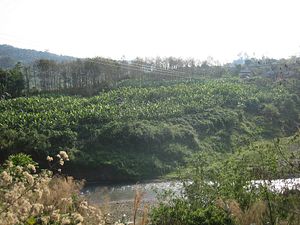On April 12, Radio Free Asia cited local government sources as confirming that Lao government orders to shut down environmentally destructive Chinese-owned banana farms, first reported in Bokeo province in January, are in fact also in force in six other provinces in the Southeast Asian state. New revelations of the China banana ban are yet another testament to the reality that Beijing’s economic influence is a mixed blessing for other Asian governments, and that has resulted in growing scrutiny about Chinese influence that can lead to policy change.
Since China’s economic rise, tiny, landlocked Laos has seen Beijing as an important partner in advancing its economy, and China is now Vientiane’s largest foreign investor. But as has been the case in other neighboring Asian states – from Sri Lanka to Myanmar to Australia – China’s rising economic influence has brought about opportunities as well as challenges felt by governments as well as the populations that they represent.
In Laos, specific Chinese projects – such as casinos, dams, and railroads – have come under scrutiny for a variety of reasons, from their unreasonable terms to their rising social and environmental costs. Although officials sometimes fret that concerns about individual projects are sloppily used to generalize about Beijing’s influence, it is little surprise that they are. And in truth, some of Laos’ leaders have grown increasingly aware of the country’s dependency on China and also sought to diversify its external relationships.
Chinese banana farms in Laos are a case in point. Chinese investors initially rushed into neighboring Laos to build banana plantations in the impoverished northern provinces, which satiated growing demand for bananas in China while providing Lao people with jobs. But multiple reports have since surfaced about how practices on the plantations – particularly the excessive use of pesticides and chemicals – have damaged the environment and endangered the lives of workers. A study last year by the Laos National Agriculture and Forestry Institute indicated that a staggering 63 percent of plantation workers in the country’s north reported falling ill over a six-month period, with 35 percent recorded in the central and south regions.
With simmering resentment among some segments of the population, the Lao government has been forced to react, ordering inspections, issuing warnings to Chinese companies, threatening to revoke their licenses, and eventually banning new plantations in some provinces. In January, for instance, authorities in the Lao province of Bokeo suspended the operations of 18 Chinese-backed banana plantations after discovering violations.
The RFA report this week shows that, as expected, the Lao government’s efforts to close down these banana farms is covering several other provinces beyond Bokeo, specifically Phongsaly, Luang Prabang, Xayaboury, Luang Namtha, Oudomsay, and Vientiane. The report cites officials from these provinces as saying that existing contracts will not be renewed once they expire, with authorities encouraging workers to stop working immediately to prevent further risks to their health. Some investors are already leaving, having seen the writing on the wall. Meanwhile, the government is also focusing on how to deal with the consequences through various means, including rehabilitating contaminated land, encouraging villagers to grow other crops like sugarcane, and offering them other jobs.
To be sure, this is hardly the first time that a government has discovered that the long-term costs of commercial endeavors can eventually exceed their immediate benefits. And, to be fair, the dilemma with such projects is often far more complex than the caricature often presented of devilish Chinese businessmen ripping off destitute Lao people. The causes are more varied; the effects are not equally felt in all cases; and popular sentiment is not universal, as demonstrated by the difficulty the government has faced in some cases with enforcing these bans. Nonetheless, the case of Chinese banana plantations in Laos continues to be among the more striking examples of the challenges posed by Beijing’s economic influence in Southeast Asia.

































